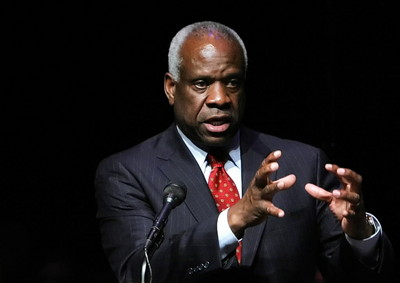CNN published an article by John Blake entitled “Three questions for Clarence Thomas” that allows them to not only distort the black conservative judge’s opinions, but also to tip-toe on the edge of racism, referring to Justice Thomas as a “sellout” and “Uncle Thomas” while hiding behind the cowardly journalistic trick of “Hey, we’re just reporting what other people say!”
In the article, Clarence Thomas is also accused of holding grudges, being a hypocrite, being a traitor, acting like a victim and playing the race card. This is all okay, since Blake provides balance with a couple of people calling him a hero and saying he’s qualified for the Court.
The main problem with Blake’s piece isn’t the blame-or-praise game–it’s the substance. There’s no possible excuse, for example, for their feigned confusion on the originalist position taken by Justices Scalia and Thomas; CNN literally conflates it with a belief in slavery.
A lot of originalist judges rhapsodize about the wisdom of the Constitution’s framers, but Thomas approaches the Constitution with a different racial history. Blacks were enslaved by many of the founding fathers who talked about liberty and freedom.
How does a black judge become an originalist when the “original intent” of the Constitution was to preserve slavery and classify slaves as three-fifths of a human being?
Let’s stop right there and ask a different question: How does a ANY judge become an originalist when the “original intent” of the Constitution was to preserve slavery and classify slaves as three-fifths of a human being?
Put another way, does originalism mean you’re in favor of slavery? If it does, then Justice Thomas is in quite the quandary but more importantly, it makes originalism a bizarre and evil legal theory…which is pretty much exactly what CNN would like you to believe.
The reality, of course, is that originalism holds no such thing. Eric Posner, writing in The New Republic, provides a decent explanation:
Originalists believe that the Constitution–the set of rules that structure and limit government–has the meaning that was ascribed to the original document by those who drafted and ratified it, as modified by the various amendments, as understood by those who drafted and ratified them. The contrary view is that the Constitution evolves with the times. Judges and elected officials interpret and reinterpret it in light of their own changing values, and these interpretations pile up and form a body of political and judicial precedent that certainly bears some resemblance to the original understanding, but diverges considerably from it.
Note that the Originalist view of the Constitution includes the Amendments, since it would be bizarre to believe in the Constitution while leaving out the Amendments. Of course, slavery was banned by an Amendment so there’s no contradiction in being an anti-slavery originalist; in fact, it’s a required position.
Rather, the distinction is between an approach to how laws are made and changed. Originalists believe this is properly done via the legislature, whereas the contrary view is judicial activism. Posner goes on to explain the real rift:
Non-originalists dominated the judiciary for decades and still dominate the academy. Although originalist ideas have floated around since the Founding, the modern theory was produced by a small group of mostly marginalized (conservative) academics, whose ideas were rarely taken seriously by the most influential (liberal) scholars in the top law schools.
This is a fundamental difference that falls along liberal/conservative lines but Blake can’t be bothered to provide an accurate explanation of the actual position originalists take, instead planting a bizarre and untenable red herring.
The political agenda lede is buried in the article–shilling to preserve the fight against common sense voter ID laws. As Blake writes:
The Voting Rights Act is considered one of the crown jewels of the civil rights movement. Its passage, which came about after King led a dramatic campaign in Selma, Alabama, is responsible for the expansion of black political power in the last 30 years.
The truth of the last sentence is dependent on whether you believe that thirty years of one-party rule that requires strict adherence to the Democrat agenda du jour equals ‘political power.’ For example, the fact that black voters don’t have a single, solitary member of the Congressional Black Caucus who is pro-life when a 2011 Gallup poll shows that nearly 40% of black Democrats identify as pro-life is just one indicator that black voters have no real representation or power except to act as a rubber stamp for Democrat policy positions.
Then CNN flatly explains the real issue:
The Supreme Court is considering abandoning Section 5 of the act, which requires states with a history of discrimination to “pre-clear” any changes in voting law with the U.S. Justice Department first.
Ah. There we go. The “pre-clearance” rule is what the Holder Justice Department used to knock down Voter IDs laws that Americans overwhelmingly favor but that Democrats oppose and fear. The pre-clearence laws that only apply to some states and give Holder’s DOJ a sharp, shiny tool to keep election fraud from being detected.
Clarence Thomas seems likely to be one of the Courtvotes that shuts down the misuse of the Voting Rights acts for political purposes, so once again Justice Thomas is fair game.
One question for CNN: who’s the real racist?

COMMENTS
Please let us know if you're having issues with commenting.